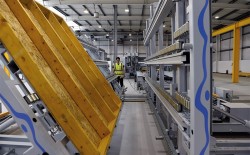THE Construction Scotland Innovation Centre (CSIC) has seen a surge in demand from companies looking to explore offsite construction methods.
Ben Westland, head of strategic and commercial operations at CSIC, told Project Scotland the team is currently involved in a number of offsite-related projects as interest grows - partly in response to meet housing targets across the country.
"There seems to be a growing interest in offsite from a whole range of organisations including government, housing associations, traditional housebuilders and major contractors. This perhaps reflects a growing recognition that it's one of the main ways the UK can help to overcome some of the challenges that the housebuilding industry has such as a shortage of skilled labour," Ben explained.
"There is a need for housing to be produced quickly, efficiently and to a high quality. Offsite is definitely a major part of the solution; it's one of the biggest areas that we work with. There's a lot of demand from the sector at the moment."
Since CSIC'S Innovation Factory opened last year, Ben said there has been particular interest from firms involved in timber-related fields in some of the state-of-the-art equipment that is available to use.
"Quite a lot of the equipment in our Innovation Factory can be used by companies who work with timber," he said. "We've got an Offsite Manufacturing Cell enabling companies who want to prototype or train staff away from their own facilities with the support of our technical team, an industrial robot and we also have the UK's first vacuum press that helps to make cross- laminated timber (CLT) and glue-laminated (GluLam) timber. This can make timber a higher-value product. A number of companies are exploring the use of CLT as a construction material to deliver their future ambitions."
CSIC is currently involved in an innovative project with the Stewart Milne Group (one of the UK's largest offsite manufacturers) and Glasgow Caledonian University, which aims to better understand and measure productivity, downtime and waste.
Data is being gathered on a Stewart Milne Homes development in Bishopton where CSIC is part-funding the work of a research team from Glasgow Caledonian University to carry out daily monitoring, comparing existing timber frame construction methods with a "more advanced" crane-erected offsite timber frame system. Photo and video evidence is being captured and analysed with a view to making improvements that could reduce material wastage and labour downtime, while also increasing productivity.
Ben added, "The project is a follow-on of a whole series of work Stewart Milne has done over the years around trying to improve efficiency and productivity of their processes, both offsite in their factories and onsite on their building sites.
"This project specifically is about how to improve the onsite bit of their processes after the offsite components manufactured in factory have been taken onto the building site. That tends to be where there are the biggest opportunities to improve efficiencies. Stewart Milne is trying to minimise waste and downtime as much as possible, developing advanced process scheduling to make their operations more slick."
Ben said some of the challenges housebuilders currently face relate to coordination of deliveries and logistical elements, especially on projects involving a large number of subcontractors.
"Deliveries can be late," he said. "It's not really a 'just in time' model that most housebuilders and construction companies operate. Because of the nature of the business model, many housebuilders use lots of different subcontractors so it's not perhaps as integrated as it could be.
"As well as that, you've also got issues to do with bad weather and other things that are outside the control of companies."
When it comes to current methods of measuring productivity, Ben admits it is a "fairly complex" process. "That's where assistance from the Innovation Centre and the university comes in," he added. "We can help companies analyse one-stage removed from their teams. Their teams are fully involved in the process but the monitoring and analysis is in the hands of an independent partner - that being the university in this case.
"Following on from work that's been done in this area across the UK at different housebuilding sites, it is our intention that this project with Stewart Milne acts as a forerunner to help other housebuilders - smaller players in particular - improve their onsite efficiency and productivity."
Ben said the findings will be disseminated to the wider industry. He hopes the initiative will inspire other companies to come forward and express an interest in taking part in innovative projects.
"Stewart Milne is acting as a flag bearer for this initiative and will share their experiences and the benefits they've realised from doing all this work. There will be an event at the end of this project where other housebuilders will be invited along to see the outcomes and note an interest in exploring these areas themselves with help of CSIC and partners.
"We're keen to speak to any construction business who is interested in innovating, improving their processes or reducing their costs. There are lots of different ways we can potentially help, including using our unique Innovation Factory facility and through our ability to call upon 13 universities, some of the expertise and latest skills the universities have is ideal for those type of companies - both technical and non-technical specialisms."
Stewart Dalgarno, director of product development at Stewart Milne Group said, "Site productivity is very important to the growth plans of the Stewart Milne Group and the future efficiency of our housing delivery approach. We have carried out previous research on our sites, identifying productivity opportunities and developed improved products and systems to exploit this.
"This project should allow us to take this to the next level, and also to share the findings, monitoring and benchmark our methodology with others in the sector. Improved productivity is good news for the industry, the end customer and the economy as a whole."
Original link - Project Scot









